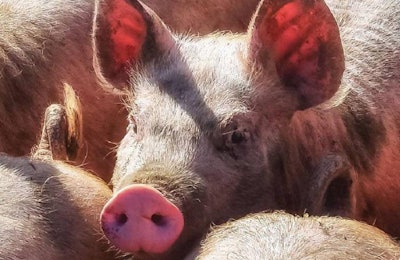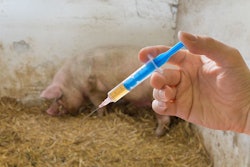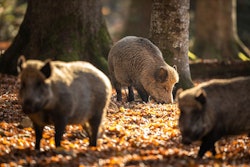
After a four-month absence, African swine fever has been confirmed again in Bhutan and new cases have occurred in India, Nepal, the Philippines, Thailand and Vietnam.
A further outbreak of African swine fever (ASF) in domestic pigs has been confirmed in South Korea by the agriculture ministry. This brings to 28 the number of outbreaks on the nation’s farms since September 2019, while outbreaks have been recorded on seven farms so far this year.
Around 5,500 pigs were scheduled for culling at the farm in Cheorwon, a county in the northeastern province of Gangwon.
At the five swine farms within a radius of 3 kilometers from the outbreak, and 19 more premises within 10 kilometers, movement controls have been put in place. Furthermore, testing of pigs at each premises and inspections are being carried out.
Among South Korea’s domestic pigs, seven ASF outbreaks have occurred so far in 2022. Of these, five were in Gangwon, and two in neighboring Gyeonggi. Both provinces border the demilitarized zone with North Korea.
Prior to the Cheorwon outbreak, the most recent ASF cases on a South Korean farm were detected at the end of September.
After confirmation of the latest outbreak, the ministry announced it was employing an all-out response to prevent the further spread of ASF in the country.
According to Pig People, ASF outbreaks totals in South Korea stand at 2,693 in wild boar (as of November 11). This is an increase of 14 since this local source’s update dated November 2.
Since the nation’s first cases were confirmed in September 2019, testing positive for the virus have been wild boar in four provinces, and domestic pigs in three regions.
Further cases reported in 3 Indian states
During the past week, cases of ASF in domestic pigs have been reported by local media in Assam, Karnataka and Madhya Pradesh.
Presence of the ASF virus was confirmed at a pig breeding center, according to The Print. Located in the district of Kannada, the farm is in the southwestern state of Karnataka.
In the central state of Madhya Pradesh, more than 115 pigs have been infected with the virus in the district of Katni. More than 80 pigs had died over the previous 15 days, reported Press Trust of India this month.
In the northeast of the country, Assam was one of the Indian states first hit by ASF in early 2020. In Udalguri, new disease epicenters are registered almost every month, according to Sentinel Assam. In the first week of this month, 52 pigs died and 64 were culled in two disease hot spots. Located in the northwest of Assam, Udalguri borders Bhutan.
Previously, the same source reported that more than 150 pigs had died in the east of the state in the district of Sivasagar in early November.
ASF returns to Bhutan
After a four-month hiatus, ASF was detected again in Bhutan at the start of November.
According to the notification to World Organisation for Animal Health (WOAH), four cases were identified in a backyard herd of 750 pigs in the district of Samdrup Jongkhar. Previously, the four animals had been imported from the neighboring Indian state of Assam.
Between April and June, pigs tested positive for ASF elsewhere in Bhutan. Located in Chukha district, that village bordered India’s West Bengal state.
ASF detected in all of Nepal’s regions
With confirmation of the presence of the ASF virus at a farm in the zone of Seti, one or more outbreaks have been reported in each of the five regions of Nepal since March.
According to the WOAH report, the latest outbreak started in the Far Western Region on August 20. Of the 400 pigs at the farm, 352 died.
So far this year, pigs have been affected by the disease at 28 of the nation’s farms. Directly impacted have been more than 19,400 pigs, 83% of which died.
Thai outbreak total passes 100
To WOAH earlier this month, the authorities of Thailand have registered a further nine outbreaks, all in village herds. Start dates were between August 1 and October 26. Where the information is given in the report, each herd ranged from 17 to 310 animals.
Six of these latest outbreaks were in the Southern region, two in the Northeastern and one in Central Thailand. Cases were confirmed in seven different provinces, including for the first time Nakhon Phanom and Nakhon Sawan.
Since Thailand’s first recorded ASF cases almost one year ago, 106 outbreaks have been registered with WOAH. More than 3,400 pigs have been directly involved through mortality or culling over this time, based on these official notifications.
Once again, sniffer dogs at Bangkok’s international airport have detected illegal meat products in a passenger’s luggage. Around 7 kilograms of pork was found in the baggage of an incoming traveler from China, reports The Thaiger.
Also this month, smuggled pig meat products from Vietnam were found by the dogs at the same airport.
Further cases in 2 Philippines provinces
In the province of Iloilo in the Western Visayas region, ASF spread to a third town this month, reports the Philippine News Agency (PNA). In two communities, depopulation was carried out of all pigs within 500 meters of a confirmed outbreak, and further culls were scheduled in another community. As well as this stamping-out process, other disease control measures have been imposed, including the sale of pork only at official markets.
In other parts of Western Visayas, local authorities are stepping up controls, such as increasing inspections to prevent the entry of live pigs and pork products from infected areas. At one city port, more than 400 kilograms of banned pork was recently intercepted and destroyed.
In western Mindanao, PNA reports that more than 4,600 pigs have died from ASF in the Zamboanga City area. Furthermore, more than 1,000 additional animals have been culled. So far, around 1,100 hog owners have lost their herds to ASF, and the area remains in the high-risk “red zone.”
Meanwhile, the Davao Region in the southeast of Mindanao is beginning to recover from previous ASF outbreaks, according to PNA. In order to speed up this process, three government agencies have agreed to contribute PHP5.5 million (US$96,000) for the recovery. This will fund repopulation, establish a breeder-multiplier unit and modernize production.
Update on ASF situation in Vietnam
So far this year, approximately 53,000 pigs have been culled in Vietnam. Cases were identified at 1,150 locations in 51 of that country’s provinces/cities, reported Chinese news agency Xinhua.
In the coming months, weather conditions are becoming more favorable to the survival and transmission of the ASF virus. As a result, provincial and municipal governments in Vietnam are being urged to strengthen local animal disease prevention measures.
Financial support for affected Eastern Malaysian farmers
The Sarawak government is offering support to farmers in the state who have been affected by ASF, reports The Borneo Post.
To help them out during these challenging times, funding totaling MYR5 million (US$1.1 million) has been offered to pig farmers.
Since the first cases of ASF in the state early in 2021, ASF has been confirmed at 32 commercial and semi-commercial farms and 600 backyard herds. Around 32,200 pigs have been culled. Authorities report that the outbreak is now largely contained, and restocking will soon go ahead.
View our continuing coverage of the global African swine fever situation.

















